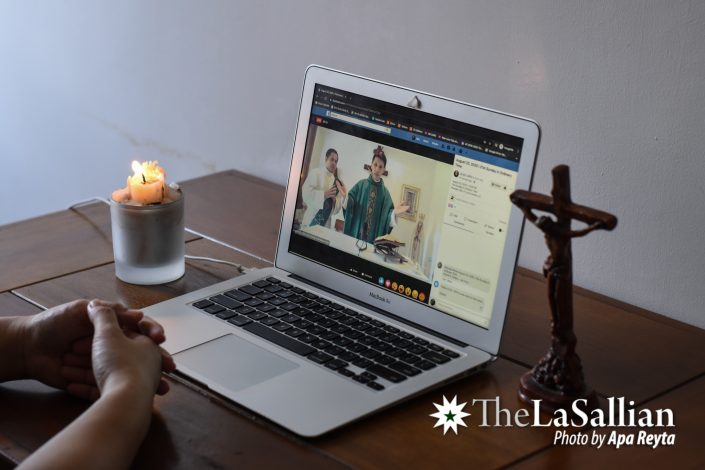Remaining steadfast in its mission, the office now holds its daily noontime masses on Facebook Live, while Lasallian Recollection (LASARE) courses have migrated to AnimoSpace. Even spiritual accompaniment remains possible via telephone for members of the Lasallian community who may wish to seek guidance and engage in faith sharing during troubled times.
Recollecting online
The Lasallian Pastoral Office (LSPO) is in charge of three LASARE courses that are part of all undergraduate students’ flowcharts. These recollection programs have students participating in activities that aim to help deepen their connection with God, normally spanning an entire day for LASARE1 and LASARE2 at the Center for Lasallian Formation, 12th floor of the Br. Andrew Gonzalez Hall.
LASARE3, the culminating program, would normally take place as an overnight stay in an off-campus retreat house for personal reflection.
The COVID-19 pandemic and subsequent quarantine measures pushed administrators to defer Term 2 LASARE1 and LASARE2 classes, with students prompted to finish the course in the following term instead. LASARE3, however, was allowed to push through on AnimoSpace.
This Term 3, all LASARE courses were held completely online. “[We] were given the chance to revise [the LASARE] modules in such a way that they will be compatible with AnimoSpace so that they can be delivered and taken through [the online platform],” LSPO Director James Laxa affirms.
The revised classes feature asynchronous modules of “prayers, silence, [and] meditation”, while faith sharing sessions, Laxa says, are held synchronously, through video conferencing or through the AnimoSpace Discussion Room, depending on the students’ or facilitator’s preference. Additionally, Laxa mentions that students taking LASARE are able to consult with the facilitators “beyond class hours”, asserting, “At a certain point, [if] you wish to discuss or consult something that disturbed you…there [will always be] one or several people available for you to connect with.”
Laxa refers to this “hybrid” approach as a way for students to experience their faith in “as many ways as possible”. “Our hope is that at least one of those methods—one of those strategies would hit the heart or would touch the heart and mind of the student,” he shares.
Additionally, students who originally took LASARE3 through a completely “self-paced” and asynchronous approach are given the option to redo the course—this time, in a more interactive faith-sharing experience with the program’s facilitator. “We offered that as an option for students if they feel they want more [from the program],” Laxa explains.
Embracing the technological resources available, the modified recollections also now heavily depend on the use of mobile devices and laptops—something that was discouraged in face-to-face sessions. Mobile phones used outside of retreat purposes, however, are still discouraged during online sessions to avoid distractions. “We rely on the honesty and sincerity of the student to really go through the retreat using media, using devices, using their laptops,” he prompts.

Hope through a screen
Before the imposition of quarantine measures last March, regular mass services would be held in one of the two University chapels. Following the subsequent closure of the campus, Laxa recalls, “As early as March 18 or around March 20, we decided there and then that LSPO will transition all its services online, including the mass.” The Lasallian Personal Effectiveness Program, held during July and August to welcome ID 120 students, gave LSPO the opportunity to experiment with the digital setup, conducting the event’s Eucharistic celebration online.
The LSPO currently uses the Zoom account of University Chaplain Fr. Luis Lorenzo to host mass, streaming it on Facebook Live daily. The mass usually involves one or two priests who perform the readings from within the University campus, while a commentator and choir group join the session remotely.
This was not initially the case, however, with readers for the earlier mass services originally composed of LSPO personnel and DLSU alumni living in remote areas. They later had to change the setup to comply with a Roman Catholic Archdiocese of Manila directive, issued last August 21, requiring mass readers to be physically present at the location of the service.
Despite the directive, Laxa shares that the LSPO did not face much difficulty when transitioning online, saying, “The LSPO team [was] very energetic in transitioning to an online service, so within three days when I proposed that we have online masses, we got it.” Viewership was also not a major concern as Laxa emphasizes their mass services will continue, “even if there would be just five people [attending]…It’s a service that is being given to all Lasallians.”
Faith and service
“You can never compare the face-to-face retreat with the online retreat,” Laxa admits. However, he notions that online sessions can offer the Lasallian community “entirely new” ways of “thinking and expressing our faith”.
Laxa also conveys that the online mass sessions continue to nourish him spiritually and allow him to “encounter God fully”, noting that there is a need for “openness” and a need to adapt during these changing times. “We will [continue to] take advantage of the online [platform],” he says, adding that students have been “appreciative” of the services. The LSPO will continue to collect feedback from the Lasallian community to determine how they can improve their services, Laxa shares, promising to “explore new avenues to bring God’s word to students”.
